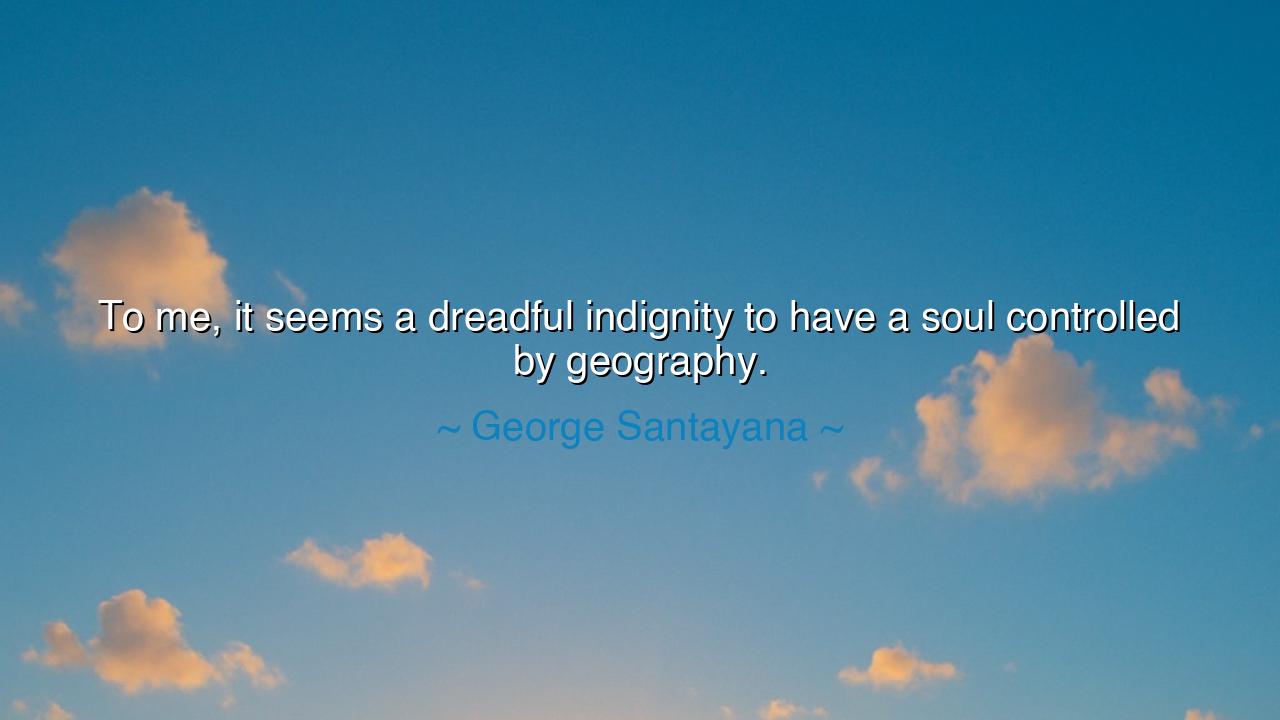
To me, it seems a dreadful indignity to have a soul controlled






“To me, it seems a dreadful indignity to have a soul controlled by geography.” So wrote George Santayana, the philosopher and poet, who wandered between nations yet never allowed his spirit to be chained by borders. In this saying, he strikes at the very heart of human existence: that the soul, eternal and vast, should not be bound by the narrow lines drawn upon maps, nor confined by the accident of birthplace. To be human is to belong to something greater than geography, to truth, to beauty, to the fellowship of mankind.
The meaning of this saying is both liberating and unsettling. Santayana declares that identity should not be shackled to soil alone. Yes, the land of one’s birth shapes us; yes, culture and language are precious gifts. But when these become prisons—when they dictate the limits of our compassion, the horizon of our dreams, or the depth of our loyalty—then the soul suffers indignity. For the human heart was made for wider journeys: to love across borders, to seek wisdom in all lands, to see humanity as one.
The origin of these words lies in Santayana’s own life. Born in Spain, raised in the United States, educated in Europe, he lived as a man between worlds. Though he loved each place, he would not bind himself wholly to any one flag or nation. He saw the danger of nationalism that devours universality, of patriotism that excludes rather than uplifts. From this vision came his declaration: the soul must remain free, lest geography reduce it to servitude.
History itself offers us lessons to confirm his wisdom. Consider the story of Albert Einstein, who fled Germany when barbarism rose. Though German by birth, Jewish by heritage, and later American by choice, Einstein declared himself a “citizen of the world.” His genius was not controlled by geography, nor was his compassion. He spoke for peace, for justice, and for humanity itself, transcending borders that others treated as walls. His life, like Santayana’s words, teaches that greatness is born when the soul looks beyond its native soil.
But Santayana does not despise homeland—he despises its tyranny. He does not say that roots are worthless, but that they must not bind us like chains. The farmer should love his field, but not despise the farmer across the river. The citizen should love his country, but not deny the dignity of other peoples. When geography commands us to hate, to limit our vision, or to enslave our destiny, then it becomes the master of our soul—and that, Santayana tells us, is a dreadful indignity.
The lesson, then, is clear: let your soul be wide as the earth, not confined to one corner of it. Love your homeland, but love also the world. Learn the traditions of your people, but open your heart to the wisdom of others. The accident of birth should not dictate the scope of your compassion, nor the reach of your dreams. To allow it to do so is to shrink the infinite into the small, to trade the eternal for the temporary.
Practically, this means living as both patriot and world-citizen. Serve your community faithfully, but extend your concern to strangers and nations beyond your own. Seek wisdom in foreign lands, in different tongues, in diverse cultures. When faced with hatred born of borders, refuse to surrender your compassion. For the soul was not made to be chained; it was made to journey, to seek, to embrace.
Thus, let Santayana’s words echo as a timeless teaching: do not let your soul be controlled by geography. Honor your homeland, yes, but remember that your spirit belongs to all humanity, and to truth itself. Walk this path, and you will live not as prisoner of the map, but as heir of the world.






AAdministratorAdministrator
Welcome, honored guests. Please leave a comment, we will respond soon